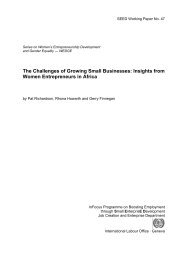manual: women workers' rights and gender equality - International ...
manual: women workers' rights and gender equality - International ...
manual: women workers' rights and gender equality - International ...
Create successful ePaper yourself
Turn your PDF publications into a flip-book with our unique Google optimized e-Paper software.
Briefing Note 10 Introduction to the <strong>International</strong> Labour Organization<br />
About the <strong>International</strong> Labour Organization<br />
The <strong>International</strong> Labour Organization (ILO) was founded in 1919 upon three basic ideals:<br />
1. promotion of peace through social justice<br />
2. recognition of collective rather than isolated solutions<br />
3. development of the notion that no country should gain competitive advantage over others<br />
through the application of sub-st<strong>and</strong>ard working conditions 25<br />
In 1946, the ILO became the first specialized agency associated with the United Nations (UN).<br />
Each specialized agency has its own area of competence <strong>and</strong> the ILO’s competence lies in the<br />
world of work <strong>and</strong> employment. It has its own constitution <strong>and</strong> membership <strong>and</strong> its own<br />
organizational structure, budget <strong>and</strong> staff. As of March 2003, there are 175 ILO member States.<br />
A unique feature of the ILO as compared to other international agencies is its tripartite structure.<br />
Employers’ <strong>and</strong> workers’ representatives participate in the ILO’s work on an equal basis with<br />
representatives of their governments.<br />
The <strong>International</strong> Labour Organization <strong>and</strong> Gender Equality<br />
Gender <strong>equality</strong> is a fundamental human right <strong>and</strong> an essential condition for achieving effective<br />
democracy. The ILO Constitution affirms, “all human beings, irrespective of race, creed or sex,<br />
have the right to pursue both their material well-being <strong>and</strong> their spiritual development in conditions<br />
of freedom <strong>and</strong> dignity, of economic security <strong>and</strong> equal opportunity”.<br />
Countries are increasingly committed to the promotion of <strong>equality</strong> of opportunity <strong>and</strong> treatment<br />
between <strong>women</strong> <strong>and</strong> men in the world of work. But governments, employers’ <strong>and</strong> workers’<br />
organizations <strong>and</strong> other civil society organizations face difficulties in making the principles <strong>and</strong><br />
provisions of international instruments effective in national law <strong>and</strong> practice. They often seek<br />
information from the ILO on the different approaches taken in various parts of the world to give<br />
practical effect to <strong>gender</strong> <strong>equality</strong> principles 26 .<br />
The ILO has approached the fundamental principle of <strong>equality</strong> of opportunity <strong>and</strong> treatment<br />
between <strong>women</strong> <strong>and</strong> men in three main ways:<br />
1. as a matter of human <strong>rights</strong> <strong>and</strong> essential condition for achieving effective democracy.<br />
The fight against discrimination on the basis of sex is considered as a fundamental issue in<br />
protecting human <strong>rights</strong><br />
2. as a matter of social justice, by improving <strong>women</strong>’s access to employment <strong>and</strong> training<br />
<strong>and</strong> their conditions of work <strong>and</strong> social protection<br />
3. as a matter of sustainable development, by promoting the participation of <strong>women</strong> in<br />
decision making <strong>and</strong> their involvement in shaping development <strong>and</strong> labour policies <strong>and</strong><br />
practices that adequately respond to <strong>equality</strong> objectives<br />
The policy instruments available to the ILO to promote <strong>equality</strong> for men <strong>and</strong> <strong>women</strong> in the world of<br />
work are:<br />
25 Briefing Kit Gender Issues in the World of Work, ILO, Geneva, 1995<br />
26 e.quality@work: an information base on equal employment opportunities for <strong>women</strong> <strong>and</strong> men, ILO, Geneva, 2001<br />
160

















